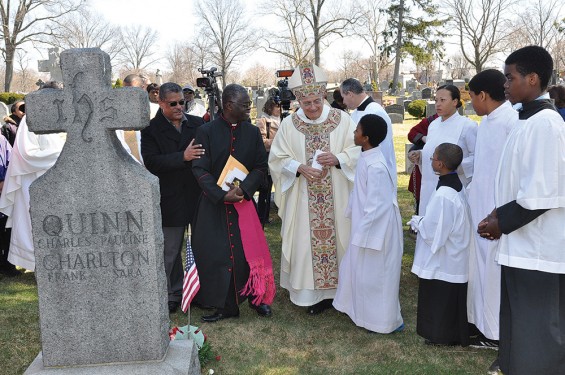
It’s been 75 years since the death of Msgr. Bernard Quinn, the founder of St. Peter Claver parish in Bedford-Stuyvesant, and the founder of Little Flower Camp in Wading River, L.I.
His legacy is such that people believe he was a saint and his cause for canonization is currently before the Congregation of the Saints at the Vatican. Since the official inquiry into sainthood has been accepted in Rome, Msgr. Quinn can be referred to as a “Servant of God.” Future steps would include the title of Venerable and then beatification and canonization.
Bishop Nicholas DiMarzio, a believer in the intercession of Msgr. Quinn, led a group of black Catholics from St. Peter Claver parish to the burial site of Msgr. Quinn last weekend as they continue to make the former Brooklyn priest better known.
Msgr. Quinn is a champion to black Catholics since he opened parishes in Brooklyn and Queens for them in the first part of the 20th century when they were not welcomed at other churches.
“He had the heart of a shepherd,” said Bishop DiMarzio in his homily at St. Brigid’s Church, which is adjacent to Holy Rood cemetery where Msgr. Quinn’s earthly remains lie.
“He accomplished what in those days was considered a minor miracle.
“We need to make him better known as a powerful intercessor.”
Bishop DiMarzio gave testimony that he prayed to Msgr. Quinn five years ago when he had quadruple open heart surgery, followed by blood clots in his lungs and heart.
“Waiting in the emergency room, Msgr. Quinn came to my mind. I felt his presence. He was there with me. I felt that somehow he had interceded for me,” said Bishop DiMarzio.
Present at the Mass and graveside prayers last weekend were the postulator of the cause for Msgr. Quinn, Msgr. Paul Jervis, and the vice-postulator, Father Alonzo Cox, the pastor of St. Martin de Porres parish which includes St. Peter Claver Church.
Msgr. Jervis, who wrote the biography of Msgr. Quinn titled “The Quintessential Priest,” described Msgr. Quinn as “a saint for our times.”
“He was a white priest who was willing to give the last drop of his blood for the black people,” said Msgr. Jervis, who was born in Guyana.
He thanked the members of the Father Bernard Quinn Guild for their presence as well as members of the priests’ family who make this annual pilgrimage to his final resting place.
“He was an example that we try to live up to,” said Brian Quinn, a grandnephew who travelled from his home in Saskatchewan, Canada. “We have an obligation to speak up for him.”
Veronica Quinn, a grandniece from Connecticut, said: “He was special. He was always talked about in the family. He challenges all of us to do the best we can.”
Family members say that their revered ancestor is remembered for a great sense of humor and as a practical joker.
As the process moves ahead, there is some talk of possibly bringing Msgr. Quinn’s remains back to a special crypt in St. Peter Claver Church.
Family members say that would require family consensus since he is buried in a family plot but no one present voiced any objection.
There also was little dissent when the question of sainthood came up. Claverites, Eva Johnson and Olive V. Deroche-Carter, both of whom were present at the priest’s funeral 75 years ago, enthusiastically responded, “Yes, yes!”
